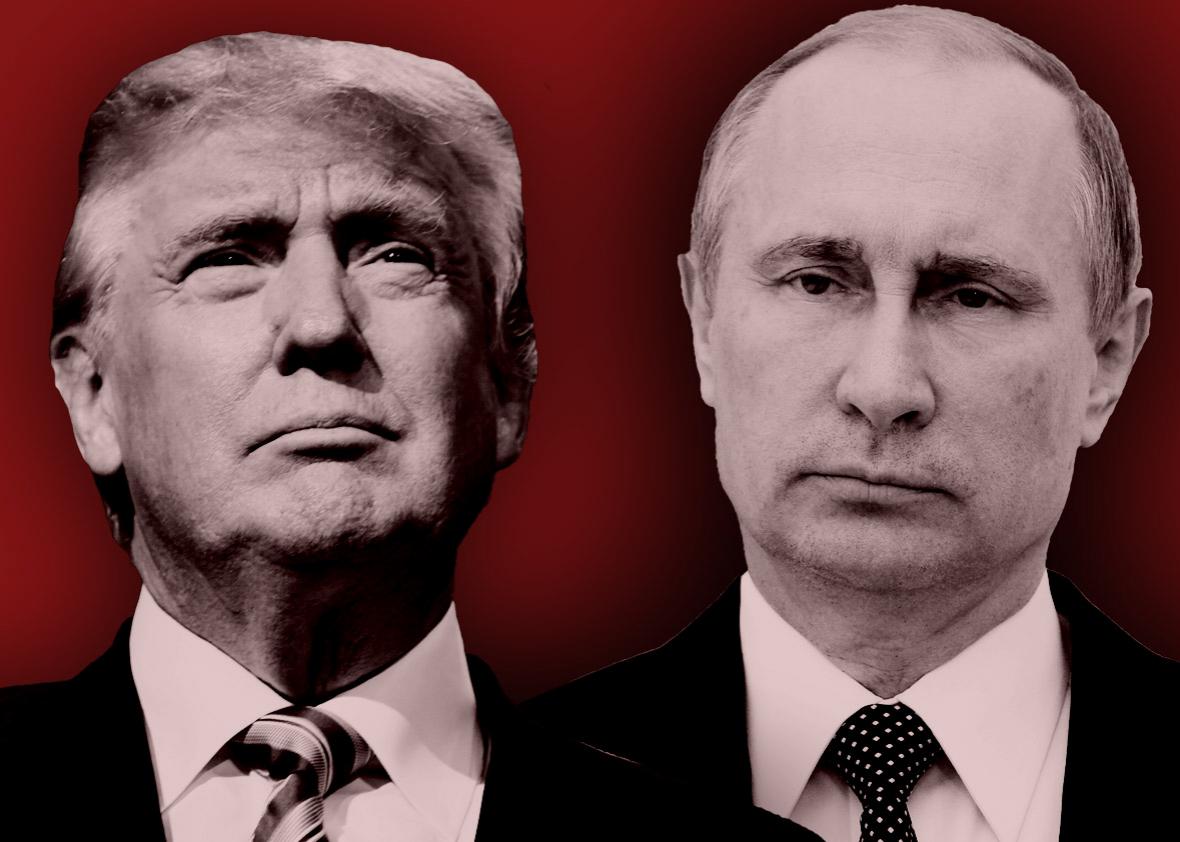Donald Trump’s convention has been marked by gross incompetence in all areas save one: He’s been highly effective in moving the Republican Party toward Vladimir Putin. The deftness of this reversal of policy is so anomalous that we need to consider its causes, as well as its consequences.
To recap: The Trump campaign showed little interest in the writing of the Republican Party platform, even as the document evolved to undermine the nominee’s political strategy and took stances at odds with his own. But his aides did intervene aggressively in one committee meeting. They pushed hard to soften the platform’s stance on providing military assistance to Ukraine. When pressed about this change, Trump aides literally ran in the other direction.
Then, on Wednesday, Trump told the New York Times that he would abandon our nearly seven decades–old commitment to collective security in Europe. If Putin rolled tanks into Eastern Europe, Trump would have to check whether those countries paid their fair share to NATO before fulfilling our obligations to protect them.
If these were sincere positions, they might be defensible. The Obama administration has been reluctant to arm the Ukrainians. There’s a coherent case to be made for American retrenchment in the world. The problem is that Donald Trump and his campaign aren’t staking out ideological positions. As I have argued, Trump has a long history of sucking up to Russian political leaders to advance his business interests in that country. His praise of Putin has correlated with large infusions of Russian cash into his real estate projects. Furthermore, his campaign is staffed by aides with financial ties to the Russian state.
For his part, Putin has recognized the opportunity that the Trump campaign presents. He has thrown Russian propaganda behind it; his intelligence services have purloined documents from Democratic Party servers, and they have begun publishing them on the internet.
And why not? Trump is Putin’s geo-strategic dream. NATO has been effective at curbing Putin’s military adventurism. Russia may mess around in eastern Ukraine, but it won’t set foot in Estonia or Poland. That’s because it has little interest in fighting a war with an alliance obligated to protect those countries. Rather than facing a resolute, unified West, he prefers conducting a negotiation with a fragmented one and has sought to destabilize Europe through support of Trump-like figures in France, Italy, and elsewhere. Nobody believes in the art of the deal more than Vladimir Putin—and in Trump, he sees a naïve, egomaniac whom he can roll.
Now that the subject of Putin’s relationship to the Trump campaign has become part of the conversation, there are several questions that require answering. And many of these pertain to Trump’s campaign manager, Paul Manafort.
As I have reported, Manafort didn’t just represent oligarchs tight with the Kremlin. He became business partners with them. He ran a private equity fund in which the aluminum magnate (and Putin pal) Oleg Deripaska invested millions. As the Washington Post has shown, this fund didn’t exactly do much investing. In fact, Manafort struggled to account for the cash he received. And rather than pay back Deripaska, he apparently went underground. In 2014, Deripaska’s lawyers noted, “It appears that Paul Manafort and [his business partner] Rick Gates have simply disappeared”: Manafort’s vanishing became a joke in certain Republican circles. So why has Manafort suddenly felt comfortable re-emerging into public view? How did he square his debts with Putin’s ally?
Another question for the campaign chairman: What are his dealings with the Kremlin? It’s clear that he has advanced its interests in Ukraine, where he managed the political rehabilitation of its favored candidate, Viktor Yanukovych. He also went into business with one of the Kremlin’s primary natural gas middlemen, Dmitry Firtash. To what extent did these relationships bring him into the inner sanctum of Russian power?
It’s a murky realm and the questions have more than the whiff of conspiracy. But the circumstantial evidence is mounting. Given that the Trump campaign seems determined to reverse decades of core American policy, policy that Putin has worked assiduously to erode, it seems foolish not to consider the dark possibilities.
